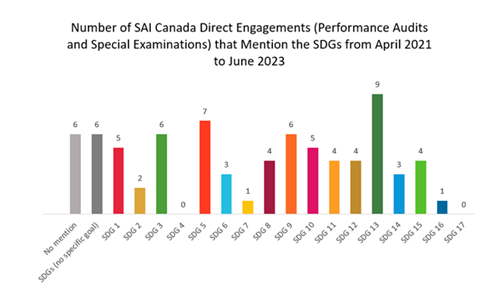Environmental audits contribute to the follow-up and review of the SDGs
12.07.2023
The INTOSAI Working Group on Environmental Auditing (WGEA) holds an audit database that includes many relevant audits on the Sustainable Development Goals (SDGs) that are under review at the High Level Political Forum 2023. The audits on SDG 6 Clean Water, SDG 7 Affordable and Clean Energy as well as SDG 11 Sustainable Cities have assessed strategic frameworks, management systems and infrastructure, the effectiveness and impact of various policies, taxation systems and subsidies as well as preventing fraud and mismanagement.
Supreme Audit Institutions (SAI) conduct performance audits on various policy areas, including environmental topics. These audits are valuable sources of information on the status of the implementation of the SDGs at the national level. The challenges they reveal also feed into the discussion on the achievement of the SDGs. As governments’ external auditors, SAIs can particularly point out the issues with cost-effective implementation and good governance.
The WGEA supports SAIs around the world in their assessments of the economy, efficiency and effectiveness of their environmental policies and holding governments accountable for their spending. The WGEA publishes studies and guidance and hosts a database where SAIs can submit their environmental audits. A glance at the most recent audit submissions from 2021 onwards suggests that SAIs have audited a great variety of SDG relevant topics. In this blog, we concentrate on the SDGs 6, 7 and 11, which are under review in the High-Level Political Forum in 2023.
SDG 6: Clean water and sanitation
In relation to SDG 6, SAIs have audited both drinking water as well as wastewater management issues.
SAI India has audited the overall ground water management framework as well as rural drinking water supply programme in Gujarat. SAI India has also audited the storm water infrastructure in Bengaluru and pointed out the larger question of redefining storm water as a critical natural resource worthy of conservation. The audit found that a robust policy governing storm water management does not exist. The State Government thus failed to consider urban surface runoff as a water resource despite the growing scarcity of water.
Audit on the wastewater treatment by SAI Latvia, found several unresolved issues in wastewater discharge and treatment despite the investment of one billion euros. The issues relate to storm-water drainage, the use of sludge, low number of connections to district sewerage systems, and management of decentralised sewerage systems.
SAI Austria audited the management of water association responsible for drinking water supply and found that the water supply facilities were in a good structural condition but urged to pay better attention to rules of procedure. In another audit on an urban water supply company in Austria, the SAI pointed out that the revenue from fees should be targeted to the renovation of water pipes.
SAI USA examined actions the federal environment agency and water systems were taking to educate the public on the risks of the neuro toxin lead in drinking water. Through statistical analysis, the audit found that areas with older housing and vulnerable populations were more likely to have lead service lines. Guidance on how to identify the location of sites at high-risk of having lead had not been updated since 1991 and many water systems face challenges identifying areas at risk. The SAI made four recommendations which are currently being addressed.
SDG 7: Affordable and clean energy
Particularly SAIs in the Global North have conducted many energy-related audits related to SDG 7.
SAI UK’s report on the energy supplier market noted that energy suppliers have a potentially important role in achieving government's net zero target of offering products and services that can help customers reduce their energy consumption or make their energy usage more flexible. The UK audit on a grant scheme on reducing household energy consumption aimed at contributing to a long-term net zero 2050 target while delivering a short-term economic boost. The scheme’s short delivery time led it to become overly complex and rushed implementation. This significantly reduced the benefits and caused frustration for homeowners and installers. Moreover, it had limited impact on long-term job creation.
SAI Austria audited district heating and cooling pipeline constructions, which would facilitate transition to green energy. The federal government had not drawn a heating strategy and the implementation stages and milestones for achieving the decarbonisation goals were not defined.
Finally, the European Court of Auditors (ECA) assessed energy efficiency in enterprises as well as the EU support to coal regions, thus addressing the question on just transition meaning greening the economy in a way that creates jobs and is inclusive. ECA found a limited focus and impact on job creation and energy transition and despite overall progress, coal remains a significant source of greenhouse gas emissions in some Member States.
The INTOSAI WGEA published in 2022 a report on policy coherence and pointed out the subsidies to fossil fuels as one of the most common examples of policy incoherence. The European Court of Auditors (ECA) and the National Audit Office of Estonia addressed this issue in their 2022 reports. ECA noted that whereas the subsidies to renewable energy have quadrupled, the subsidies for fossil fuels have remained relatively constant over 2008-2019. NAO Estonia concluded that environmentally harmful subsidies have not been identified in Estonia, nor has their impact been assessed. There is also no plan to amend or gradually phase out those measures. This indicates that SDG target 12c on phasing out harmful subsidies faces serious difficulties.
SDG 11: Sustainable Cities and Communities
Audits related to urban sustainability (SDG 11), focus on waste management, air pollution and urban transport.
SAI Ecuador audited the administration of waste management and found problems with planning, monitoring and evaluation, achieving of objectives, as well as mismanagement of funds and personnel resources plus lacking IT-systems. An audit on bio-waste management concluded by SAI Latvia, found that government has not developed a bio-waste management system that is proportionate, efficient or economically justified. The implementation of the system has been delayed significantly due to its chaotic implementation, lack of coordinated management and cooperation with all stakeholders.
Some audits have notified the risk of crime and fraud in waste sector. SAI UK noted that waste crime is perceived to be widespread causing economic losses and impacts on the environment and people’s lives. Investigation found that authorities do not have the data to identify and assess the full extent of all waste crime, which makes it difficult to prioritise their response effectively. SAI Estonia pointed out that there is a significant risk that in order to avoid paying pollution charges, scamming takes place as ‘waste recovery’ at landfills when waste is disposed.
SAI Austria has audited climate change adaptation in cities and paid attention to suitable air circulation and fresh air corridors. Both SAIs of Austria and UK have audited the emissions from cars, especially the NO2 causing health risks. SAI Austria suggests further measures for expanding public transport and speed limits, whereas SAI UK called for better overview of the relative impact of different issues, and the slowness in national action to tackle the challenges on major roads and motorways.
SAI UK also assessed carbon emissions from cars and government support on the purchase of ultra-low and zero-emission cars and for installation of charging infrastructure. SAI UK called for an integrated plan with specific milestones. SAI Austria assessed the subsidies for the use of and research on e-vehicles and the charging infrastructure. The conclusion was that government's ambitious goals on increases of e-vehicles and charging infrastructure were far from being reached.
Finally, the European Court of Auditors found in its audit on sustainable urban mobility that six years after an EU policy was set, there was no clear indication that EU cities are fundamentally changing their approaches to moving people around cities and shifting urban traffic to more sustainable and environmentally friendly modes of transport.
Finally, the INTOSAI WGEA provided support for auditing sustainable transport in a report published in 2022. It includes list of potential audit approaches, audit questions as well as criteria.
Linking audits with the SDGs
Some SAIs have specifically connected their audits to the SDGs. SAI Canada integrates SDGs into all its audit work by considering linkages to the SDGs during audit selection and audit planning. As a result, many performance audit reports include findings and recommendations related to SDG implementation. The figure below shows the number of performance audits by SAI Canada from April 2021 to June 2023 that consider each SDG. Some audits mention more than one SDG, in which case they will be double-counted.

For example, an audit examining programs that provide funding for climate-ready infrastructure found that the department mentioned both SDG 6 and 11, however, it did not identify targets with indicators for these SDGS or any of the others it mentioned. SAI Canada recommended that the department identify the SDG targets that its programs contribute to and establish performance indicators specific to each target in order to track and report publicly on progress.
Besides SAI Canada, SAI India has also assessed the overall ground water management framework against national SDG indicators, noting that the activities of the responsible authority were not aligned with the SDG targets and indicators.
SAIs’ audits provide rich evidence on the issues that governments face in implementing policies related to the SDGs. SAIs call for robust strategies, coordinated and timely implementation, as well as obeying the rules of procedure. SAIs urge for effective funding schemes, both concerning individual measures but also whole-of-government spending avoiding incoherent and wasteful spending.
Want to learn more about how SAI’s contribute to the follow up and review of different efforts related to the SDGs? Visit our website, audit database, and a recent publication on the SDGs.
By Alfredo Gomez (SAI USA), Vivi Niemenmaa & Kati Hirvonen (WGEA Secretariat)

 Photo: Vivi Niemenmaa
Photo: Vivi Niemenmaa

